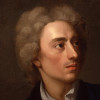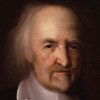“ Desire of Knowledge, and Arts of Peace, enclineth men to obey a common Power ”
Thomas Hobbes, Leviathan (1651). copy citation
| Author | Thomas Hobbes |
|---|---|
| Source | Leviathan |
| Topic | power desire |
| Date | 1651 |
| Language | English |
| Reference | |
| Note | |
| Weblink | http://www.gutenberg.org/files/3207/3207-h/3207-h.htm |
Context
“as also, all men that are ambitious of Military command, are enclined to continue the causes of warre; and to stirre up trouble and sedition: for there is no honour Military but by warre; nor any such hope to mend an ill game, as by causing a new shuffle.
And From Love Of Arts
Desire of Knowledge, and Arts of Peace, enclineth men to obey a common Power: For such Desire, containeth a desire of leasure; and consequently protection from some other Power than their own.
Love Of Vertue, From Love Of Praise
Desire of Praise, disposeth to laudable actions, such as please them whose judgement they value;”
source


